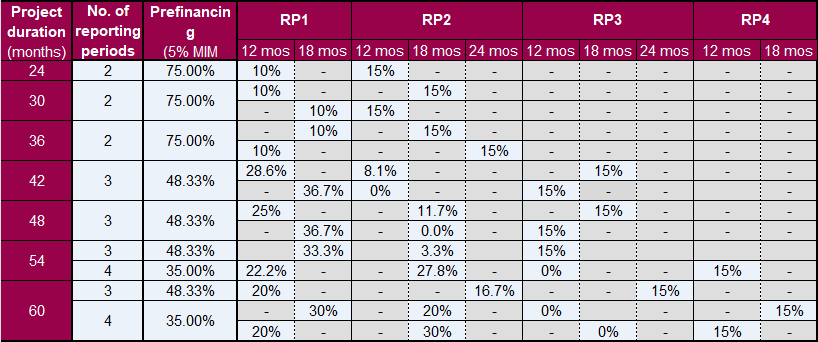The Swiss Guide to Horizon Europe financial reporting – EC versus SERI requirements
17th October 2024 at 3:23 pm
As the European Commission’s (EC) rules for periodic reporting in Horizon Europe projects are well-established, EU-funded project beneficiaries know what’s expected. However, due to Switzerland’s non-association with Horizon Europe, Swiss project partners are funded by the State Secretariat for Education, Research and Innovation or Staatssekretariat für Bildung, Forschung und Innovation (SERI / SBFI) and must thus report to them separately, following a distinct schedule and reporting requirements. In this blog post, we share our experiences from our first completed SERI financial interim report, how SERI’s requirements differ from those of the EC and give you some practical tips to ensure that your SERI financial reports are accurate, timely and compliant.
Fewer SERI reporting periods
The number and duration of reporting periods as defined by the EC depend on the project duration, the Horizon Europe programme or instrument and other factors. For example, 5-year projects like our GLIOMATCH project normally have 4 reporting periods with reporting periods of 18-18-12-12 months. However, in one of our recently approved 5-year Pathfinder-Open projects (currently in grant preparation and soon to be communicated), there are only 3 periods with 24-24-12 months. The different options are shown in the table below and sometimes there is room for negotiation on the choice of reporting period durations during the grant preparation phase as this influences the cash flow in your Horizon Europe projects, which is explained in more detail in one of our previous blog posts.

SERI has an easier schedule. For projects with a duration of 36 months or more, the first period always lasts for 24 months, while this is 12 months for projects with a shorter duration. The second period covering the remainder of the project lifetime irrespective of the project’s duration. So, in a 5-year project, Swiss organisations need to deliver only 2 instead of 3 or 4 reports.

Easier payment schedule by SERI
Both the EC and SERI provide similar pre-financing (first payment) and final payments. However, the interim payments are quite different and much easier for SERI-funded organisations. This is how it works:
- The pre-financing only differs in terms of % of the grant; while the EC pays from 40 to 80% of the grant before or at the project start, SERI provides 50% of the Swiss organisation’s budget.
- While the EC retains a total of 15% for the final payment (10% of the grant and 5% for the Mutual Insurance Mechanism), SERI grants a final payment of 20%.
- The EC transfers interim payments upon approval of each interim report. The amount(s) depends on the costs claimed for the previous period. In contrast, SERI pays 30% of the grant upon approval of the only interim report.
In case of underspending, the final payment will be adjusted by SERI whereas in case of overspending, the maximum grant as stated in the subsidy contract (“Subventionsvertrag”) is most likely fixed as is the case for EU-funded grants.
More details in SERI financial reports
Fortunately, the EC and SERI generally follow the same financial rules. In one of our previous blog posts, we summarised several tips and tricks on how to comply with these and avoid common errors. However, when comparing the requirements and required details and documentation by the EC to those of Switzerland’s SERI, there are big differences for all cost categories. For example, to declare the personnel costs, the signed timesheets and proof of salary payments need to be uploaded to SERI’s reporting platform. To claim other direct project costs, Swiss organisations are required to submit all receipts and invoices as scans. All costs – personnel, consumables, travel and other costs – need to be itemised and inserted in the official SERI template (financial summary sheet) and be fully consistent with all documentation.
In sum, despite our many years of EU experience and participation in dozens of EU projects (FP7, H2020 and Horizon Europe), the financial reports to SERI represent a significant additional workload. After several consultations with SERI and based on our first report of the CORENET project, one of the first SERI-funded projects, was approved without any changes or any additional requests.
More details in SERI financial reports
As the largest Swiss cooperation partner in Horizon Europe projects with over 35 ongoing projects, including 14 SERI-supported projects, we bring a wealth of experience to the table. Our expertise in SERI reporting requirements and audit regulations ensures that your documentation meets all current standards and new requirements and that you receive your next tranche of funding promptly without any objection.
We will be happy to support your company in preparing your SERI report, reviewing the documents to be submitted and/or answering your funding-specific questions. We will also be happy to provide you with more comprehensive advice on your project finances and the planning and implementation of future project reports. Further information can be found on our website. If you have any questions or are interested in working with us, please do not hesitate to contact us.

Yannic Fechtig
Innovation & Digitalisation Associate

